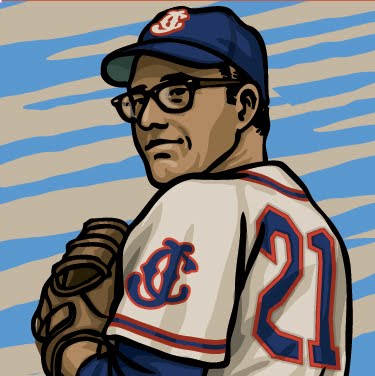Friday, September 5, 2014
177. "El Toro" Cepeda: The Babe Ruth of Puerto Rico
This whole season I have been completely immersed in the history of baseball, so much so that I have not been able to attend a single ballgame. I live within crowd-hearing distance of the Cincinnati Reds stadium and 15 miles from a really fun unaffiliated minor league team, yet I've been so busy I haven't had time to sit in the stands and enjoy the game I have written and illustrated all year. In a way, that isn't a bad thing. The new replay rules have really dampened my enjoyment of the game. Take last night for example: my wife is a die-hard Angels fan, and watches every game. In the 9th inning there was a close pick-off play and the dopey umpires stood around waiting 5 minutes for some clown in New York City to make a call that should have been handled right on the field in Minnesota. Five Minutes. Baseball's biggest drawback is that some see the game as too slow. How does this help? I don't know. I just stuck my nose back into another book on baseball history and let my mind find the safe haven of a simpler game.
I find myself doing that more and more recently, retreating inside my mind and finding solace in baseball history. Every morning I read the papers and see how things are going bad all over: Ukraine, Gaza, Iraq, China... baseball, as always, gives me a brief reprieve from all the chaos of the modern world. It wasn't until sometime in July that it all hit home for me. I had downloaded the third game of the 1936 World Series: New York Giants vs. New York Yankees. I don't particularly care for either team and of course I know how the series ended, but I decided to listen to the whole game for "atmosphere" while I worked on a drawing of Jake Powell for my book, a member of the Yanks that year. I was struck by the energy of the broadcast - this was the World Series - the most important sporting event in America and the broadcasters made you hear that in their voices. As the innings ticked by I slowly realized that when that game was played millions of Americans were listening in, many in the game the peace and solace I do decades later. The fall of 1936 found the world falling apart. Spain was torn apart by civil war and the Soviet Union, Germany and Italy used the conflict to test out their ideology and military hardware in a precursor to WWII. The United States had sank back into depression and millions were out of work, many for 5 years or more. Japan was being taken over by a military who within a year would throw Asia into a war that would last a decade. Yet, on the afternoon of October 3rd, 1936 virtually every ear in the nation was glued to their radio to hear Tom Manning, Ty Tyson and Red Barber call the third game of the World Series. With what was happening in the world, their urgent and enthusiastic calls and the very audible roar of the crowd took on a whole new meaning.
Baseball, then as now, has always been a great comfort and a pleasant though brief distraction from the world around us. The New York Mets are in town this weekend playing the Reds. I think I will go. I need to go.
Now remembered as the father of Hall of Famer Orlando Cepeda, back in the 1930’s Pedro Cepeda was Puerto Rico’s greatest ballplayer. Called “El Toro” for his build as well as his combativeness on the field, Cepeda refused offers to play in the Negro League due to his concerns over how Blacks were treated in the United States.
Cepeda’s talent is evident in his being a member of the 1937 Cuidad Trujillo Los Dragones team. The Dragonnes brought together the greatest talent outside the Major Leagues including future Hall of Famers Satchel Paige, Josh Gibson and Cool Papa Bell. When the Puerto Rican Winter League was formed in 1938, Cepeda played on the Guayama Brujos (Witches) with Paige and won the batting championship the first two seasons the league operated. In subsequent years Cepeda consistently beat Hall of Famers Josh Gibson, Roy Campanella, Buck Leonard and Monte Irvin in batting.
While many ball players have been compared to Ruth for their talent on a ball field, Cepeda truly earned his title of “The Babe Ruth of Puerto Rico” by matching Ruth in the hard-living and hard-drinking category as well. The Bull lived just long enough to see his son sign a contract to play pro ball before his excesses and malaria caught up with him. Orlando used his $500 signing bonus to pay his father’s funeral expenses. Although his father never got the chance to see his son play ball, 45 years later when Orlando was inducted in the Hall of Fame, his son was pleased to see his father was already there in a team picture of the 1937 Cuidad Trujillo Los Dragones.
Subscribe to:
Post Comments (Atom)




Agree with you Gary, I wish for simpler times myself! I wish I was born a generation earlier and watch dad race his way around those Dexter Park bases. Or take in a Bushwick vs Bay Parkways game,,, oh the memories! Thanks for the great artwork you did of dad, at times it helps me trip back in time when I close my eyes and have a cold beer.... Thanks Gary for that.... Alan.
ReplyDeletenice share, thanks
ReplyDeletetoko mas jakarta barat
toko mas jakarta barat